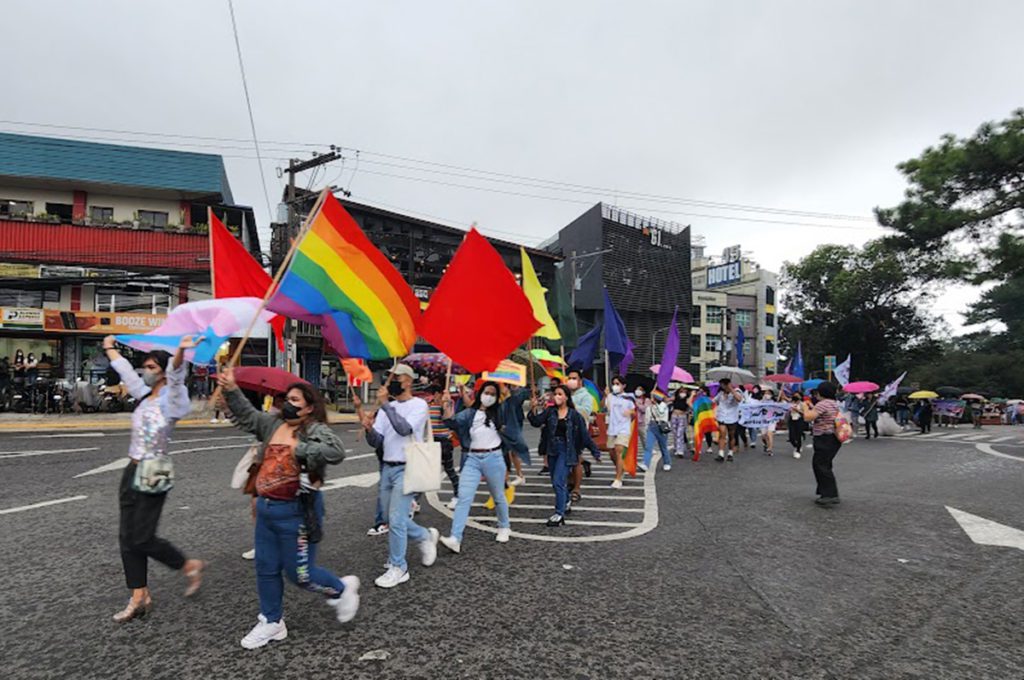By SHERWIN DE VERA
www.nordis.net
Originally published on Rappler.com on June 26, 2022.
BAGUIO CITY — Kyra Isabelle Antonio’s journey as a trans-Igorota started in kindergarten.
“Back then I knew that I was different. I was more into things that are stereotypically for girls – dolls, dresses, some things that are colored pink,” the Ibaloi from Benguet province told Rappler on Saturday, June 25, on the sidelines of the Pride Month celebration here.
Antonio said she was still unaware of the concept of transgenderism in her teenage years.
“I just knew that when I would see a transgender [woman] walking and having all the characteristics of a woman, I wanted to be that person,” she added.
It was in college that she finally identified herself as a trans woman.
“It was not actually the typical sad story that you would hear, where the parents are not accepting of their children because of their identity,” she said.
Antonio admitted that coming out “in the conservative Igorot culture” was challenging.
However, her journey was generally “a smooth flow of self-discovery” compared to peers.
Like Antonio, Wency, who requested that her surname be withheld, “never struggled with having to come out” to her family. She is bisexual and hails from Sagada, Mountain Province.
Wency explained that “aside from having a certain level of acceptance” because of her lesbian aunts, it was “like a form of protest” for her to “not ‘come out.’”
“I feel like I do not owe my family my gender identity. In the community, I feel the same,” she added.
Wency told Rappler that for someone attracted to both sexes like she is, gender identity may not be that big an issue for the community.
“If I marry a man and have a child, I will definitely not have to face any form of ostracism. If I unite with a woman, I may or may not be ostracized. It depends. What if I unite with a woman and decide to have a child? I could still be accepted,” she said.
“What is important to the ili (village) is for us to produce a child. And I feel like it will not matter to the ili whether I am a lesbian, transgender, or alien so long as I will have a child.”

SEEKING EQUALITY. The LGBTQ+ community in Baguio City chants for the passage of an anti-discrimination measure based on sexual orientation, gender identity and expression, and sex characteristics (SOGIESC) during their Pride Month celebration on June 25, 2022. (Sherwin de Vera)
Double jeopardy
Unlike Antonio and Wency, bisexual JP Badongen’s voyage to self-acceptance was bumpy.
“As a member of the indigenous peoples and LGBTQ communities, I was at the intersection of discrimination against two sectors. My experience was like double jeopardy,” said Badongen, who spent part of his childhood in Bauko, Mountain Province.
Spending his childhood and teens in his village and the city, he recalled experiencing discrimination for being an Igorot. But the prejudice he faced was more apparent because of what others deemed as his effeminate behavior.
“I was not exempted from the macho perspective in the Cordillera,” Badongen told Rappler.
“When I was growing up, it was always emphasized that I should act in a masculine way. I should be taraki (act like a man).”
While his family was generally understanding and supportive, some people treated him “in a less desirable way” for being binabai (girl-like), with many of them invoking religion.
Sometimes, he would suppress the urge to express his feminine side “to spare myself from being bad-mouthed by my peers.”
“It was not until I learned about the struggles of the LGBTQ+ community in the Cordillera that I started to appreciate who I am. It motivated me to express myself openly because, despite the label, I can still serve the people and help individuals like me,” Badongen said.
Tolerance and openness
Antonio, Wency, and Badongen were among 300 members and allies of the LGBTQ+ community who marched down Baguio City’s Session Road on Saturday to mark Pride Month.
While the three believe that Cordillera culture has become more tolerant of the LGBTQ+ community, they also acknowledged much work still needs to be done to reach acceptance.
“It is a continuing process in making people understand the different gender identities in the LGBTQ+ community. Only when you understand the spectrum – beyond the label, the color, the physical, can people properly respond to their needs,” said Antonio.
For Badongen, it is all about understanding the LGBTQ+ community’s call for equality. “They need to understand that we are not asking for special treatment. We are asking to be treated equally like any other human being.”
Northern Luzon Pride convener Francis Siapno Lopez said the “macho” mentality, especially in the tribal areas of the Cordillera, poses a significant challenge. However, they remain hopeful because of the “openness of the people to be educated.”
“We had a great experience when we had Pride 101, and one of the things we discussed was about breaking LGBT stereotypes in the communities,” he said.
“Since the people’s mentality is one of the issues, our approach should also be mental. We start with educating more people so that they can be accepting of the LGBT and be our allies.” # nordis.net

![“I just knew that when I would see a transgender [woman] walking and having all the characteristics of a woman, I wanted to be that person."](https://www.altermidya.net/wp-content/uploads/2022/06/Trans-Igorota-Kyra-Isabelle-Antonio.jp_.webp)








0 Comments